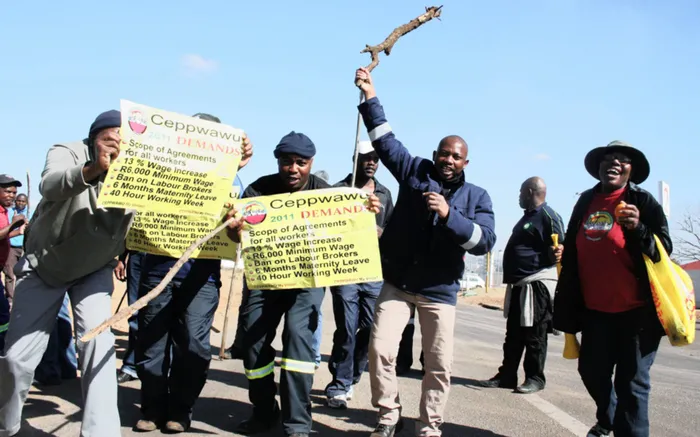
Several members of the National Union of Metalworkers toyi toyied outside three petroleum companies' depots in Waltloo. The workers are demanding a salary increase of between 10 and 13 percent. The gates at the three depots were closed while police patrolled the area. The protesters refused to speak to the press. Photo: Sarah Makoe Several members of the National Union of Metalworkers toyi toyied outside three petroleum companies' depots in Waltloo. The workers are demanding a salary increase of between 10 and 13 percent. The gates at the three depots were closed while police patrolled the area. The protesters refused to speak to the press. Photo: Sarah Makoe
Groups of striking workers marched on steel and engineering factories on Monday, banging on gates and waving sticks as they sang protest songs.
With a series of new strikes looming, supplies of fuel, essential medication and consumables have been threatened as protesters continue to shut down factories.
Many of the workers, who marched in industrial areas in Pretoria and close to the Joburg CBD on Monday, brandished National Union of Metalworkers of South Africa (Numsa) T-shirts, bandanas or caps, hurling abuse at staff who fled the buildings.
Strikers toyi-toyied outside three petroleum companies’ depots in Waltloo where gates at the three depots remained closed while police patrolled the area.
The 117 000-strong Numsa strikers were joined on Monday by the 70 000 member Chemical, Energy, Paper, Printing, Wood and Allied Workers Union (Ceppwawu), a move expected to further affect industry negatively.
Gauteng Department of Health spokesman Simon Zwane said on Monday the strike held very little threat to government healthcare in the province over the short term.
“If it goes on for a long time, then of course it could prove a problem. We will be holding discussions with suppliers to check on their supply lines,” said Zwane.
There were no fuel shortages on Monday despite 70 000 petroleum workers downing tools across the country, Engen Refinery said.
“At the moment there are no shortages. Our sites are all wet as opposed to going dry,” spokeswoman Tania Landsberg said.
“We are doing everything we can to keep our sites wet and have contingency plans in place across the country. We are in good shape at the moment.”
She said there were no reports of violence or intimidation of non-strikers.
Shell SA Refining spokesman Dennis Matsane and BP Southern Africa spokeswoman Glenda Zvenyika could not immediately be reached for comment.
Sapref spokeswoman Margaret Rowe was unable to comment on possible fuel shortages but said the plant had no intention of shutting down. “Although Ceppwawu has called for a national strike, Sapref does not anticipate that they will need to shut down,” she said.
Sapref, a joint venture between Shell and BP, is the largest crude oil refinery in Southern Africa and provides for 35 percent of the country’s refining capacity.
The Steel and Engineering Industries’ Federation of SA (Seifsa) said it was hopeful of a speedy resolution with striking engineering workers.
“The bilateral engagements between the two largest players in the industry were reasonably positive in nature and appear to be moving closer to one another in an attempt to reach a possible solution to the current wage negotiation impasse,” said the federation’s executive director, David Carson.
“I believe that a high-level commitment to the cessation of the violence and the conclusion of a mutually acceptable agreement was evident and feel cautiously optimistic.”
The DA has called on President Jacob Zuma to ensure his administration managed issues pertaining to the current strike season.
Also joining the strike on Monday was the General Industries Workers Union of SA (Giwusa). Giwusa had members in the pharmaceutical, glass, chemical and fast-moving consumer goods, fibre and particle board industries.
They were planning to march to the Chamber of Mines in Joburg today.
They are demanding a minimum salary of R6 000 a month and a 40-hour work week.
The National Union of Metalworkers of SA (Numsa), the Metal and Electrical Workers Union (Mewusa), and the SA Equity Workers Association (Saewa) were demanding wage increases ranging from 10 to 13 percent, and a ban on labour brokers. - Pretoria News
